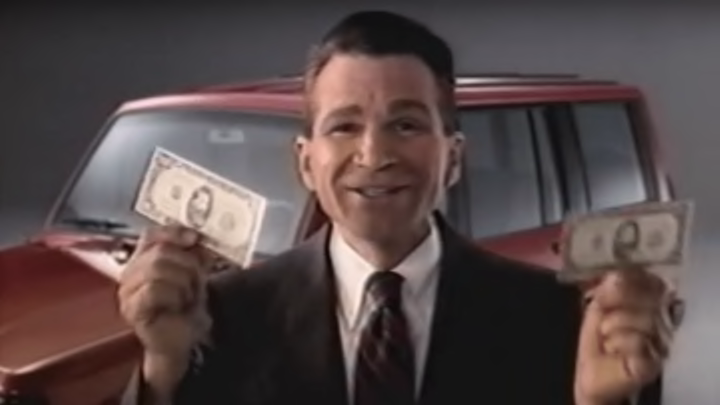Of the many Japanese car manufacturers dominating the domestic auto market in the 1980s, Isuzu wasn't the most recognizable. The company, which arrived in the U.S. in 1981, had an ad budget that was less than a tenth of Toyota’s. Even if there had been more money to spend, television spots for vehicles were notoriously cookie-cutter. There were always long shots of sedans on swerving roads, quiet cabins, and relaxed drivers. It was hard for consumers to tell one from another.
That all changed with Joe Isuzu, one of the most dishonest, unethical—and successful—car salesmen of all time.
From 1986 to 1990, actor David Leisure played the fictional automotive dealer who lied through his plastered-smile face, turning the modest car company into a household brand name. Making outrageous claims about the abilities of his cars with a “He’s Lying” disclaimer flashing onscreen, Leisure became instantly recognizable as an amusing send-up of the shady salesman cliché.
The only problem: Joe Isuzu was so popular that people forgot he was trying to sell cars.
The Isuzu campaign was developed by the ad agency Della Femina, Travisano & Partners, who had been tasked by the carmaker to boost their profile in the U.S. With a limited budget, the firm decided to focus on a salesman who never met a tale too tall. Isuzu boasted about cars costing $10.80 (he moved the decimal point), able to drive up mountains, or getting 300 miles to the gallon.
Jon Lovitz was the firm’s first choice for the role, having perfected insincerity as the Pathological Liar on Saturday Night Live. But the agency eventually went with Leisure, an actor who had bit parts in the Airplane! films and enjoyed a measure of success in a series of phone book ads in 1983. (Prior to that, he lived in his car—a Volkswagen.) He filmed just one Isuzu spot before being called in to do six more.
Despite dealerships being apprehensive over a parody of their own sales staff, the spots were an immediate hit. Isuzu hit a reported 18 percent spike in sales during the rest of the year, with Leisure achieving the kind of spokesman recognition reserved for cereal mascots. As Joe, he filmed a cross-promotional commercial for Burger King in 1988; four years later, he pushed A&W root beer. In a speech, Ronald Reagan compared Isuzu's huckster demeanor to that of Nicaraguan leader Daniel Ortega.
But Isuzu’s popularity had a troubling consequence. After the 1986 spurt in sales, the company sold roughly the same amount of vehicles in the first half of 1987. (Actually, 50 fewer.) Both Isuzu and advertising industry experts expressed concern that Isuzu was such an entertaining persona that people were actually paying more attention to him and less attention to the product he was selling—the car.
Isuzu attempted to highlight more product features in subsequent ads. Leisure, however, remained the focal point in the eyes of the audience. In 1990, after more than 40 appearances, he received a first-class letter telling him the company was retiring the campaign.
While Leisure found work in sitcoms like Empty Nest, a struggling Isuzu shifted its focus to trucks. In 2001, they resurrected Joe to push their new Axiom, but it did little to impact their modest sales. By 2008, just 7000 of the more than 16 million cars sold in the States bore an Isuzu label.
Leisure reprised the role a handful of times, most recently for Mitt Romney’s 2012 presidential campaign. Owing to Isuzu exiting the U.S. sedan market in 2008, he’s one of the few corporate mascots to actually outlive the corporation that employed him. Speaking on the character’s fame in 1987, the actor was prophetic. “Maybe people love the commercials,” he said, “but don’t know much about the cars.”
